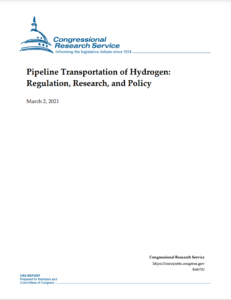Full Title: Pipeline Transportation of Hydrogen: Regulation, Research, and Policy
Author(s): Paul W. Parfomak
Publisher(s): Congressional Research Service
Publication Date: March 2, 2021
Full Text: Download Resource
Description (excerpt):
Some in Congress have proposed hydrogen as an environmentally superior alternative to conventional fossil fuels for vehicles and power generation, among other applications. Delivering hydrogen to scattered facilities—such as power plants, industrial sites, and fuel distribution hubs—would require an expansive hydrogen pipeline network. Accordingly, the House Select Committee on the Climate Crisis 2020 majority staff report recommended that Congress draft legislation to facilitate the development of hydrogen infrastructure, and that federal agencies create an associated plan and change their regulatory framework to support it. The House Appropriations Committee report on the Energy and Water Development Appropriations Bill, 2021 (H.Rept. 116-449) calls for additional hydrogen pipeline research at the Department of Energy (DOE).
Congress has acted to facilitate the development of hydrogen pipelines through various measures over the last 30 years, including provisions in the Spark M. Matsunaga Hydrogen Research, Development, and Demonstration Act of 1990; the Hydrogen Future Act of 1996; the Energy Policy Act of 2005; and periodic appropriations to agency and program offices. If Congress supports a policy requiring a national network of dedicated hydrogen pipelines, it may encounter both technical and non-technical challenges. Key policy issues which Congress may examine include the regulation of pipeline siting, including potential federal-state jurisdictional conflicts, and the regulation of pipeline rates and terms of service. The application of PHMSA’s existing pipeline safety regulations to a large national network of dedicated hydrogen pipelines also may garner consideration. Understanding ongoing needs for pipeline-related R&D under any national hydrogen strategy, and determining what federal support may be required for it is likely to be a factor in budgeting and oversight of federal agency programs. How hydrogen pipelines fit into broader federal oversight of energy pipeline security also may be an issue. Congress faces mapping the relationship between hydrogen pipelines and other federal (or state) energy initiatives; overseeing related activities among different federal agencies; and prioritizing federal efforts to develop hydrogen pipelines.
